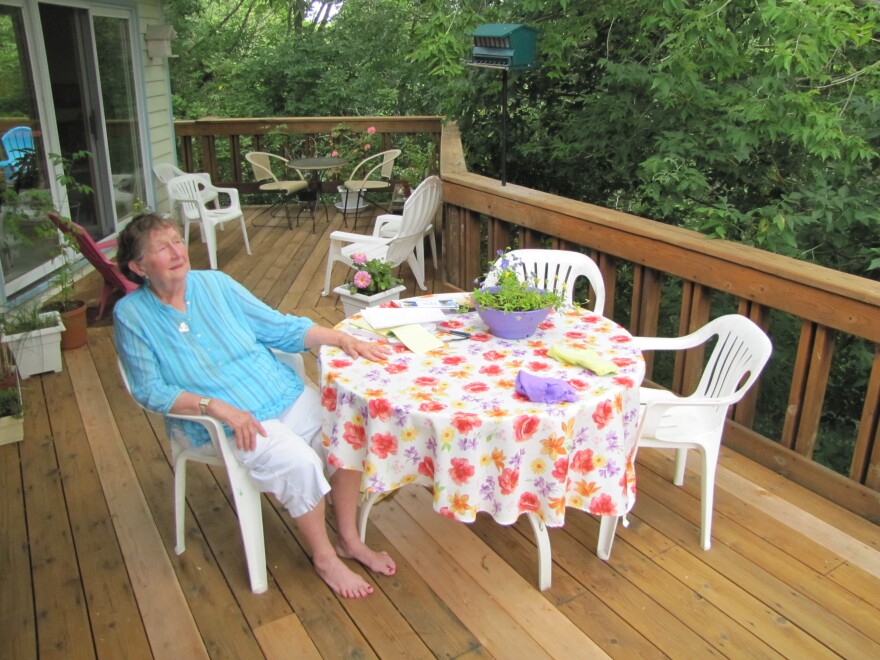To describe June Eastvold as a spunky octogenarian and retired Evangelical Lutheran Church campus pastor only skims the surface of the woman.
Today, Port Washington is her “habitat”, but Eastvold’s life has taken her from Milwaukee to the Pacific Northwest; social justice and activism followed her along the way.
More recently Eastvold spearheaded what she would describe as an environmental stewardship “spiritual awakening” event based in Port Washington. Now in its third year, the New Wind Folk Schoolwill kick off its latest three-day cycle this Friday.
From her shaded deck, Eastvold described the 19th century Danish roots of the folk school concept, but FIRST wanted to know how much air time she’d be given to tell the “New Wind” story.
When I explained it would likely be twelve minutes, Eastvold worried that wouldn’t be enough.
She feels a strong sense of urgency about her mission.
But, back to the folk school concept. Eastvold says a famous theologian, humn writer, educator and social activists of 18th century Nikolaj Grudntvig came up with the idea.
“N. F. S. Grundtvig was a complicated, gorgeous man, who was so prophetic way back in the 1700s who identified that we are part and parcel, species in a chain of a miracle that comes to us to celebrate, to care for to give back to,” Eastvold says.
She says two hundred years later, the Civil Rights Movement followed the concept of the Danish folk school.
“Holistic, inter relational, collective accountability, celebration, courage and living the truth strong and yet having a lot of fun,” Eastvold says.
She wants to drill down to what she considers a central point – the earth is our economy and we're making a mess of it.
“Everyone is hysterical about the economy. There is no economy apart from earth and we are wasteful and abusive and destructive; it’s like humankind is committing its own genocide. There is no economy …it’s like humankind in committing its own genocide. It is a counter energy,” Eastvold says.
She hopes the folk school helps build a conversation about learnig to care for the earth.
“We are not at the top of the pyramid. When we are wasteful or the river runs dry, we turn to dust. Because we are nature. And what we do when we waste and destroy is catapulting us into destruction,” Eastvold says.
So, what can the New Wind Folk School accomplish?
Eastvold says its aim is for those who are seeking answers.
“We’re calling it a pilgrimage. We’re opening it, we’re exploring and discoveries,” Eastvold says.
The folk school will start off with a water symposium, lead by Val Klump, scientist with UWM’s School of Freshwater Sciences.
“He loves us,” Eastvold says, “he comes back year after year.”
She says the group will discuss how science can help us come up with solutions to what are largely man-made problems.
“How can we factor in the matter of climate change and the affect on the waters and the storms and the overflows and the droughts and the whole rhythm and harmony that is destructed, really, by the nature of the human,” Eastvold says.
She believes solutions are only possible through collective responsibility.
“I love that people have rain barrels and eat organic food, but it’s not going to save us. We have to learn to speak to one another. Otherwise there is no reason to think about the future.
Eastvold says author Andrea Orcutt will provide an important piece of the folk school experience. She will discuss her research which culminated in her book Restoring Earth, Community and Soul.
“She’ll say this is where we are, this is where we need to be and this is what we have to do,” Eastvold says.
Eastvold says the three-day journey will be interspersed with hikes on the Milwaukee River, good food and personal stories.
“And then of course and we have the troubadours and the music. There has never been a movement ever, ever in our world that has not had its song. The song people lift up and sing,” Eastvold says.
She stops short, worrying her twelve minutes of air time has run out. She slips in one last story. Something Eastvold says she found on the Internet.
“I usually don’t spend much time on it, but this is what the folk school is really aiming for. It’s the story of a classroom and the instructor said to the students ‘I want you to name the seven wonders of the world.’ The students were busy writing things like the pyramids, the Great Wall of China and the Taj Mahal, things like that. The class was going to take a vote, but one student was having a hard time. She said. ‘yes there are so many, but what I have is the seven wonders of the world are to see, to hear, to touch, to feel, to laugh, to taste and to love.’” "That," Eastvold concludes, “that is what the folks school is all about.”







